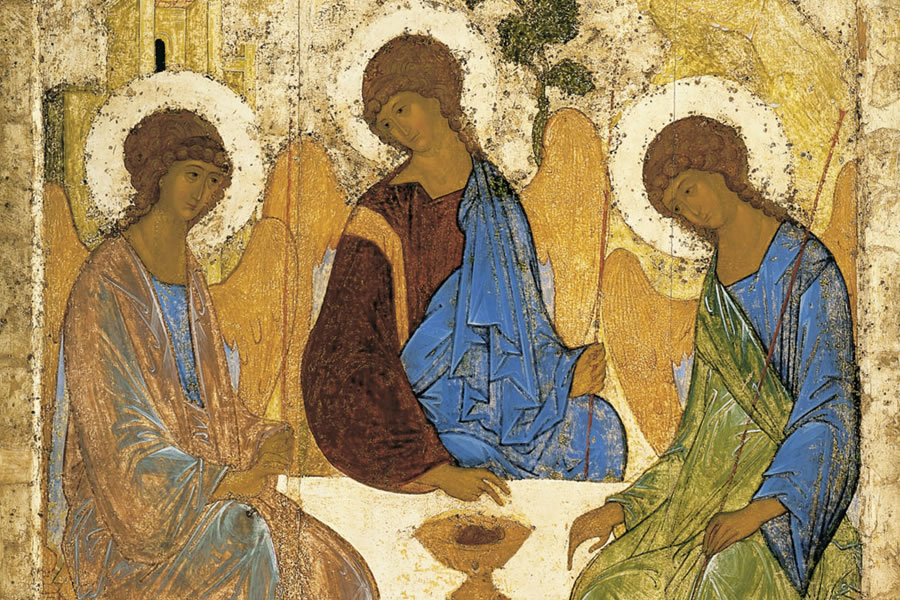
Astonishing Mystery
05-30-2021Weekly Reflection© J. S. Paluch CompanyAstonishing is the term that Clement of Alexandria used in referring to the Holy Trinity. Today’s scriptures tell the astonishing stories, from Moses in the Old Testament to the end of Matthew’s Gospel, of how we mere humans are intended to be intimately associated with our loving God. We see in Deuteronomy that Moses reminds the new generation of Israelites of the “astonishing” fact that, even though the ancient world teemed with gods, their God was the only God, that “there is no other.” Saint Paul in the letter to the Romans write about those who follow the Spirit as being “sons” of God, which of course would make us brothers and sisters of Christ, and, as he says, “joint heirs with Christ.” Another astonishing statement! Finally, Christ bestows the Holy Spirit on the world as his continuing presence and force of divine revelation. How can we not be astonished?
READ MORE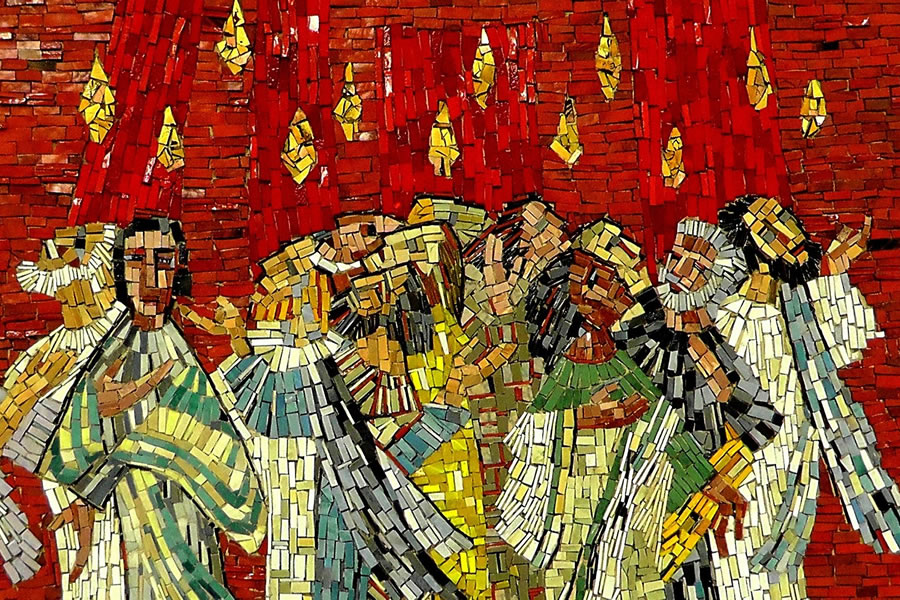
Come, Holy Spirit, Come
05-23-2021Weekly Reflection© J. S. Paluch CompanyCome Holy Spirit! Today we celebrate Pentecost, the outpouring of the Holy Spirit upon the first disciples and an all who are baptized. We also commemorate the birth of the church. Before Pentecost, the disciples remain hidden and uncertain; at Pentecost, those who were gathered were filled with the spirit and proclaim the wonders of the good news of Christ to all. The spirit guides us to the truth of Christ's love and mercy and strengthens us to live us disciples. Without the Holy Spirit, we would perish; with the Spirit, we have life to the full. Relying on the Spirit, we are given the grace to turn away from the many temptations that we face each day and prefer instead what is it good and holy. Come Holy Spirit Come!
READ MORE
God's Holy Order
05-16-2021Weekly Reflection© J. S. Paluch CompanyThere is a certain, sacred order to the way God envisions our place in the world. We are created inn love, for love. As disciples of Jesus Christ, God’s love is at the heart of all we are, have, and do. Peter was concerned that this holy order be restored following Judas’ betrayal of Jesus. Jesus’ selection of twelve apostles was significant for the Jewish people, a harkening to the twelve tribes of Israel. In prayerfully discerning Matthias as the twelfth apostle, the bothers made certain that God’s holly order would prevail. Their witness ensured that Christ’s love would be shared and embraced to all the world and throughout time.
READ MORE
Love is Real
05-09-2021Weekly Reflection© J. S. Paluch CompanyIn today’s Gospel, Jesus likens our relationship with him to a plant with many Love. Songs and books, plays and artistic masterpieces have been created to convey the truth that love is real. As Christians, we know that love is of God. In laying down his life, Jesus pours out God’s selfless, sacrificial, undying love. Jesus opens the door to a new relationship between God and humanity, that of friendship, of intimate closeness. Jesus calls us to show this same love for others, knowing that in doing so, we fulfill God’s will. As the account of Peter, Cornelius, and all in his household attests, this great love of God cannot be contained by our preconceived notions of the way things are in the world.
READ MORE
The Fruit of Faith
05-02-2021Weekly Reflection© J. S. Paluch CompanyIn today’s gospel, Jesus likens our relationship with him to a plant with many branches. We, the branches, are called to remain so close to Jesus that we bear fruit, loving one another as Christ loves us. Saul for the fruit of his faith through powerful witness that drew others to Christ. And the branches that grew into the early church were extraordinarily fruitful. What is the fruit of your faith in Jesus Christ?
READ MORE
Belonging
04-25-2021Weekly Reflection© J. S. Paluch CompanyThere’s nothing like belonging. Many of our deepest experiences in life are of the belonging we feel among family or close friends. We may experience belonging within our parish, even saying we are “at home“ in our faith community. Sometimes we say we belong to a school alumni Association or social club. Our deepest belonging however is in the heart of God. We are God's children, precious in God sight. We are so treasured that Jesus laid down his life for us. Knowing that we belong to God and Jesus Christ gives us a new eternal perspective on life. Peter understood this when he explained that his healing of the man who had been disabled from birth have been accomplished through Christ. Jesus describes the relationship between him and those who believe in him in intimate terms – we who were in relationship with Christ know that our very lives depend upon him.
READ MORE
New Life
04-18-2021Weekly Reflection© J. S. Paluch CompanyPeter saw Jesus after the resurrection. He listened as Jesus told the disciples all that have been written about him in the Scriptures, all that he had said and done when he was ministering among them. Peter heard how Jesus said fulfilled all in the law of Moses, the prophets, and the Psalms. Jesus the Messiah had come to be among them to bring them peace, to offer forgiveness of their sins. Peter shared this good news with the crowd together to hear him tell the secret story, the story of God’s love, poured out and Jesus the Christ and offered to the whole world. All who here and believe her offer new life, life in which God’s love is perfect in them. Are you listening? Are you ready to share in this abundant new life?
READ MORE
Faith
04-11-2021Weekly Reflection© J. S. Paluch CompanyWhat a difference faith makes! The faith of the early community of believers led them to rise beyond the selfishness that so many of us struggle with as they group and communion with Christ and one another. They did not find the Commandments burdensome, but rather centered their lives on the love of God and neighbor that Jesus taught through his life, death, and resurrection. It is good for us to remember that faith is a gift. The journey of faith is not always straightforward and is often marked by doubt and moments of weakness. The apostles’ faith grew as they experience the risen Jesus. Jesus surely knew they needed the peace he offered in the presence of the Holy Spirit, as do we who have not seen the Lord and yet have come to believe in him.
READ MORE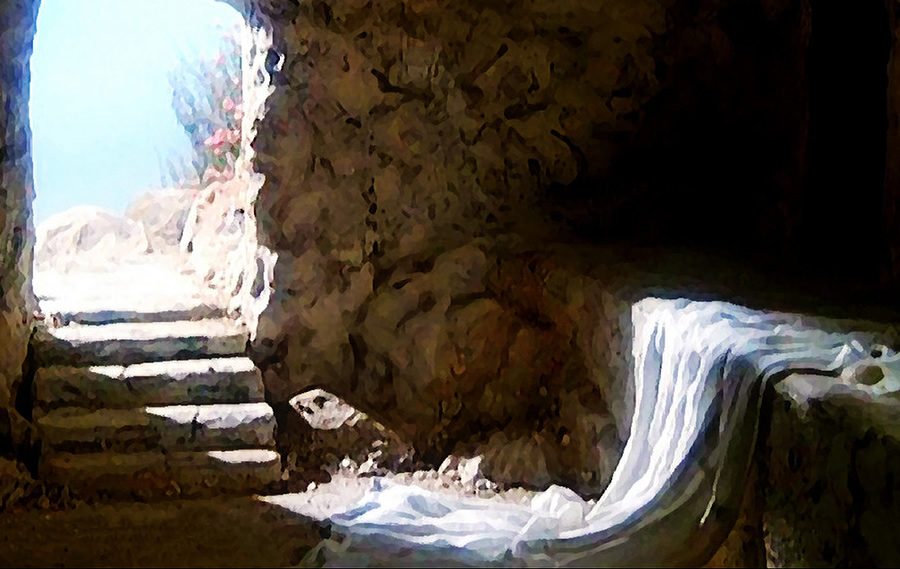
Transformed by the Resurrection
04-04-2021Weekly Reflection© LPiAlleluia! Christ is risen! Imagine the flood of emotions that Mary of Magdala must have experienced on that first Easter morning. Grieving and yet determined to visit the place where Jesus' body had been laid. Mary would have been stunned to find the tomb empty. Imagine Simon Peter and the other disciple who, upon hearing Mary's announcement, ran to see for themselves. On Easter, we hear the story of Jesus' resurrection as through for the first time, through the account of Mary's discover and the testimony of Peter who powerfully shared Christ's Paschal Mystery. We, too, have come to believe through their faithful witness. We are called to see what is above, turn away from sin, and live as people who are forever transformed by the Good News of Jesus' resurrection.
READ MORE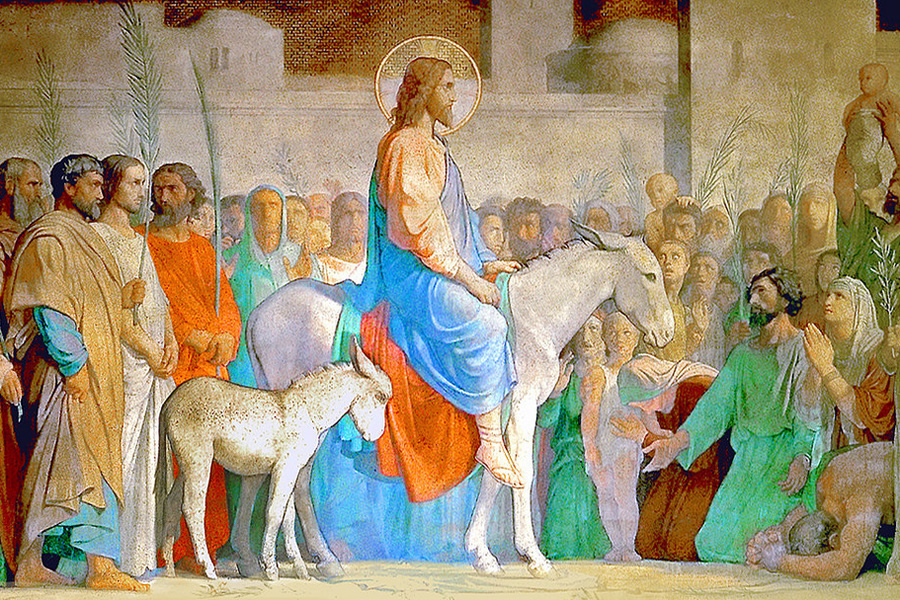
A Preview of Holy Week
03-28-2021Weekly Reflection© J. S. Paluch CompanyPalm Sunday marks the beginning of Holy Week and previews its themes and events. Today's liturgy begins with the commemoration of Jesus' entry into Jerusalem. The Roman Missal gives three options for how this can be done, the most elaborate which begisn with the priest, ministers, and the entire assembly outside. The Gospel accound of the entry is read, after which palms are blessed and distributed. Then everyone enters the church in procession, singing songs or psalms. However, the joy is temporary; the Passion narrative recounds how, after an intimate meal with his disciples a few days later, Jesus is arrested, tortured, crucified, and buried. The from Isaiah is one of four Suffering Servant songs, while the psalm lkikewise gives voice to the suffering of the innocent. The reading from Philippians affirms the Incarnaton as God's embrace of the entire human situation, including suffering and death.
READ MORE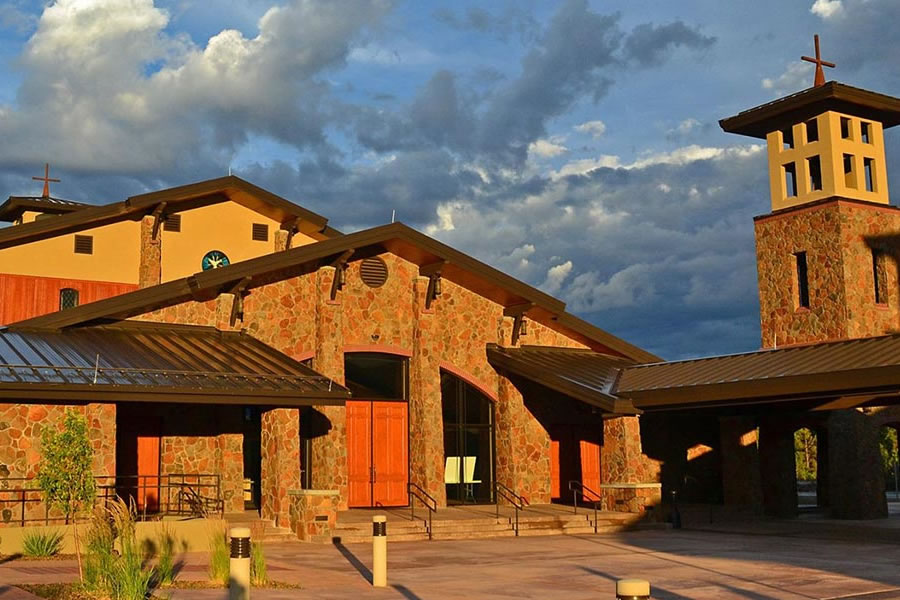
Spring Covid Update
03-18-2021Weekly ReflectionAnna HoffmanDear Parishioners,
Over the past couple of weeks, we have noticed an increase in Mass attendance, especially at the 10:00 am Mass. We see this as a good sign that people are feeling encouraged about returning to the celebration of the Eucharist and we anticipate that attendance will continue to rise, especially as we approach Holy Week, Easter Season, and summer.
Although the capacity limitations set forth by the Diocese of Phoenix have not changed, the overarching goal is to adapt and accommodate the increase in attendance with joy and hospitality! Beginning this weekend, there will be some minor modifications to allow for more people to be seated in the church.
READ MORE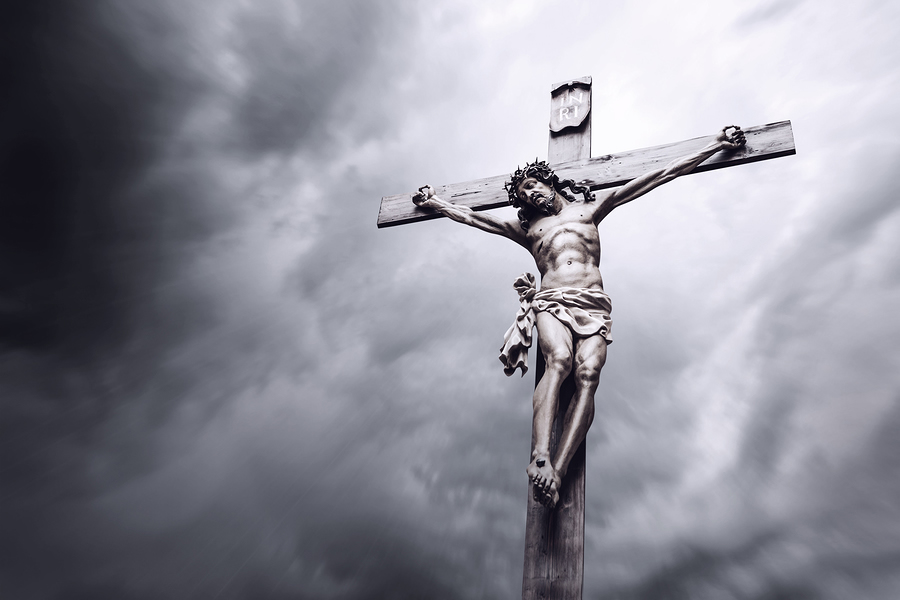
Redeeming Humanity
03-14-2021Weekly Reflection© J. S. Paluch CompanyThe end of second Chronicles claims that “all the princes of Judah, the priests, and the people“ were continuously unfaithful to their covenant with God. This infidelity ultimately led to 70 years of exile in Babylon, after which Cyrus, the Persian ruler who conquered Babylon, allows the people of Israel to return home and build their temple; the Psalmist reflects on the bitterness of those 70 years. Paul is lyrical and praising God “who is rich in mercy“ and who “brought us to life“ with Christ, while the evangelist recounts preaching by Jesus on the same theme. this is the section of John that includes the aft memorized John 3:16: “for God so loved the world…“ All three readings emphasize God‘s desire to rescue or redeem humanity – from pain – and suffering.
READ MORE
The Law
03-07-2021Weekly Reflection© J. S. Paluch CompanyToday’s reading from Exodus tales of God giving the 10 Commandments to Moses; this passage is well-known to Christians, but it is only the introduction to the entire Mosaic Law, or Torah. The psalm is a small section of the longest in the Psalter – 172 verses – Which are generally couplets (two lines) praising the law is perfect, true, just, right, and so on. The law is both a source of Jewish identity in the centerpiece of the Jewish intellectual tradition.
READ MORE